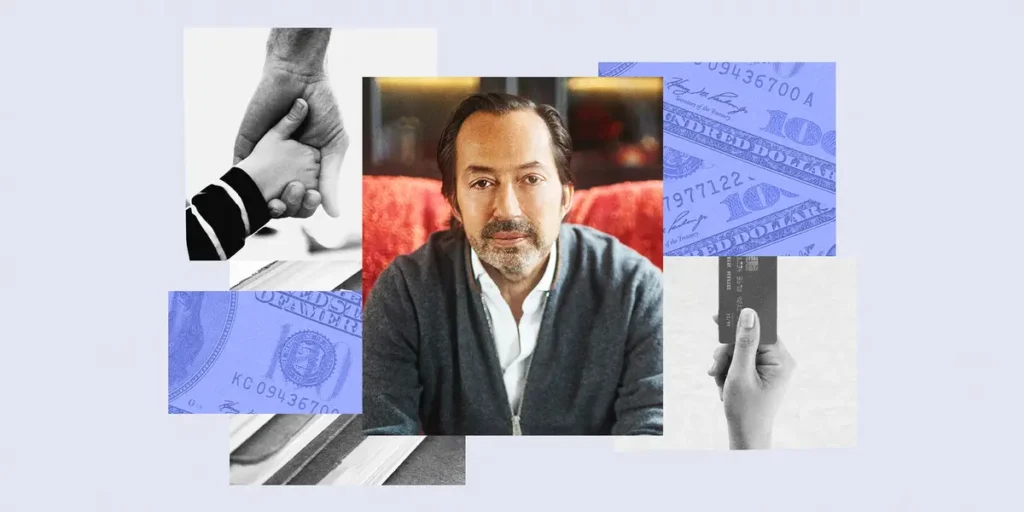This as-told-to essay is based on a conversation with Jean-Baptiste Wautier, who lives in the UK and is the founder of Wautier Family Office. It has been edited for length and clarity.
I had a family, at least in part, to create what I never had: a home with love. My parents were not good people — we’ll leave it at that. We were middle-class, and while they had the money to support me, they didn’t, financially or otherwise.
That’s part of where my drive came from. I was bullied in school and penniless in college. I had to make my own way.
Today, I have four wonderful children, two grandchildren, and a loving wife. They’re my greatest success. I’ve also had financial success in both the UK and US, leading companies and investing.
While I live in the UK, I regularly visit the US to be with my daughter and granddaughters. We often spend our entire summer holidays there to get the family together.
I’ve always been shy about naming my wealth publicly, but I’ll say this: I am an ultra-high-net-worth individual, the way banks define it. (Editor’s note: Financial institutions typically define an ultra-high-net-worth individual as someone with at least $30 million in investable assets.)
I want my estate to emphasize impact over ego. Here’s how I do that, with my family and philanthropy.
1. I shelter my kids from my wealth
Miljan Živković/Getty Images
Today I’m 56, and my kids are 21, 24, 26, and 33. They still don’t know the extent of my estate.
I wanted my kids to feel normal and not experience the negative impacts that too much wealth can have. I didn’t travel business class with them, live in a massive home, or send them to fancy summer camps.
Yet, my wife and I realized we can’t shield the kids entirely from their wealth — that’s just the way the world works. Still, we agreed not to share the extent of our fortune until the children are all adults and working.
My youngest is finishing up his master’s degree and will begin working full-time in the fall, so that’s coming up soon. I’m a bit apprehensive about it, because I don’t know how it will go.
We’ve always told the kids not to count on an inheritance. They work in jobs that pay enough — two of my children make about £60,000 pounds annually (about $80,000). I’m glad they’ve made solid, successful lives for themselves.
2. I write down my values
ridvan_celik/Getty Images
When my kids were young, I taught them the three family values: honesty, courage, and empathy. As they got older, I introduced two more principles: humility and integrity.
When my oldest was a teenager, we created a family charter, outlining those values. The six of us signed it, and we all still have a copy.
Whether you’re guiding your children, a company, or a charity, writing down your values is essential. This creates a guiding document for future generations, ensuring your legacy remains true to its original intent and isn’t diluted over time.
3. I focus on one specific impact
dusanpetkovic/Getty Images
To really make change, you need to be focused. My philanthropy is targeted toward educational access.
That’s fairly narrow, but I still deal with many decisions: do I invest in educational access in France, where I was educated? In the UK, where my kids went to school? Or in the US, where my grandchildren are being raised?
When I’m evaluating where I can have the most impact, I look at the sustainability of an organization.
I want to know my money will continue to make a difference over time. Otherwise, it’s like throwing money in the fire: there will be heat for an hour, but no lasting change.
4. I give anonymously
wing-wing/Getty Images
Too often, I see philanthropy that’s driven by ego: people want their name on the side of a building, or a public write-up. There will always be ego involved in giving, because it feels good to give. But I try to actively push back on that by donating anonymously.
I created a scholarship at the private high school my children attended. The school wanted to name it after me, but I declined — I said that I’d prefer if it were just called the school’s scholarship fund.
Then, they suggested at least telling the recipients so that they knew who funded their education. I didn’t want that either — those students deserve to be there, and shouldn’t feel indebted to me.
5. I accept how complicated estate planning is
My family is incredibly close: that’s my greatest legacy. Even so, there are real generational differences between us.
Where I see purpose, my kids may not. I haven’t figured out how we’ll handle that: I imagine it will be through many conversations in the coming years and decades.
Even in a family with so much love and trust, estate planning is going to be one of our biggest challenges.


